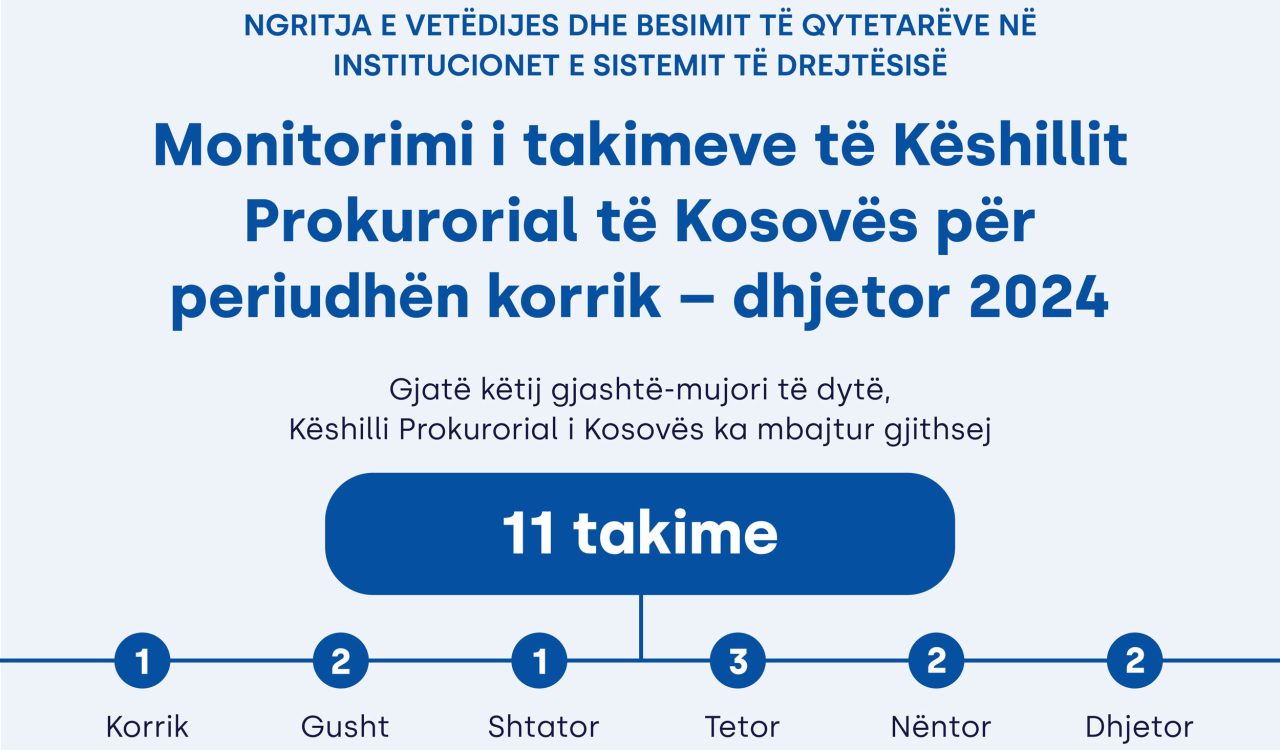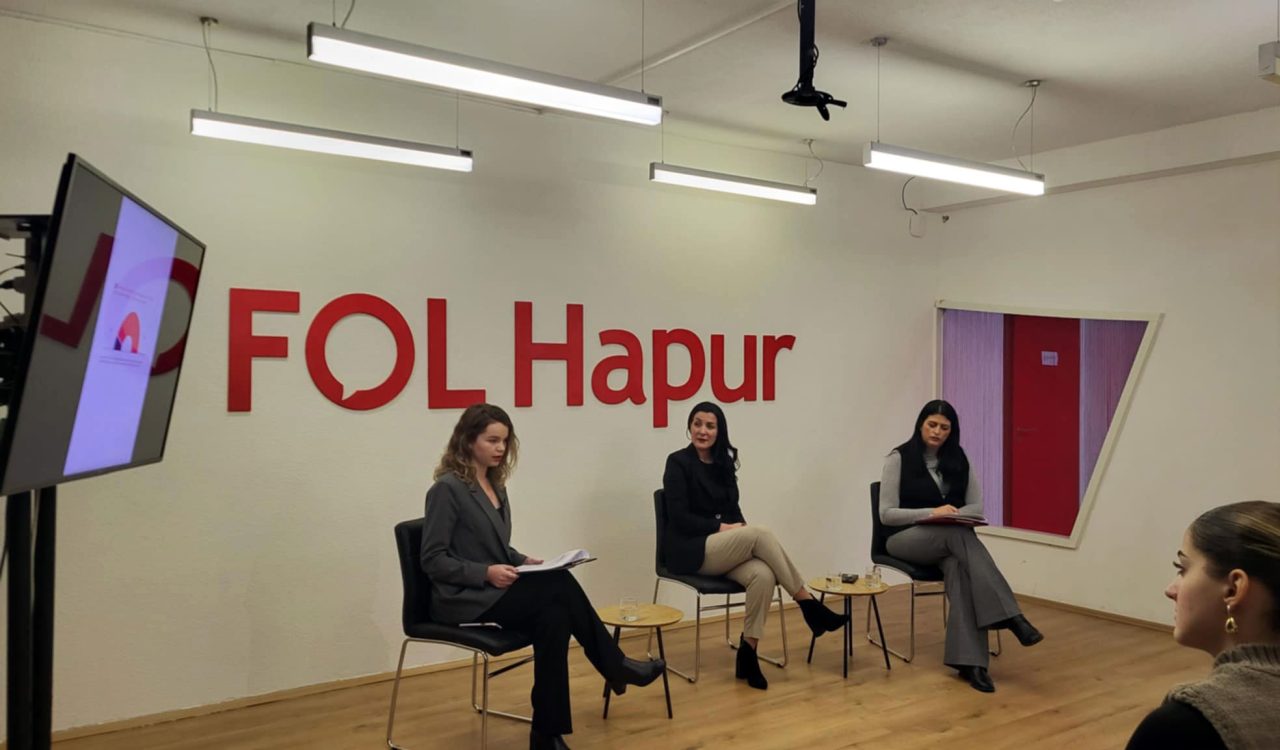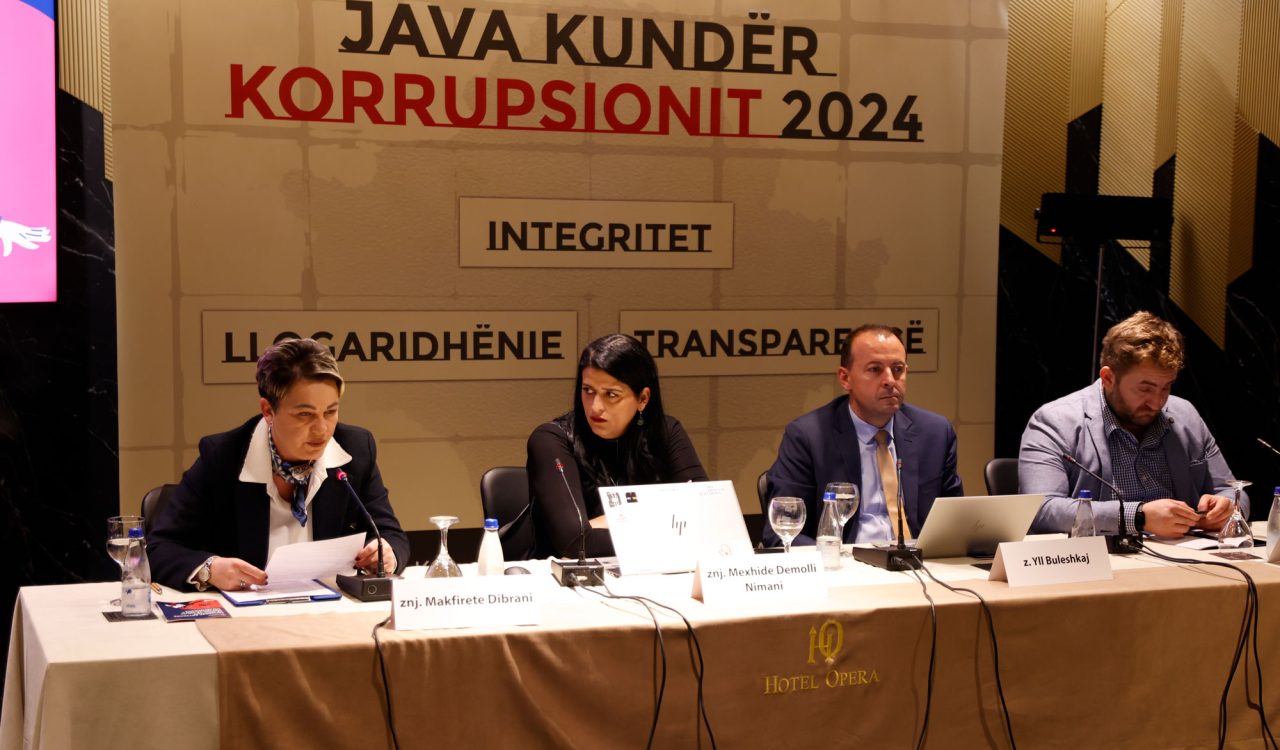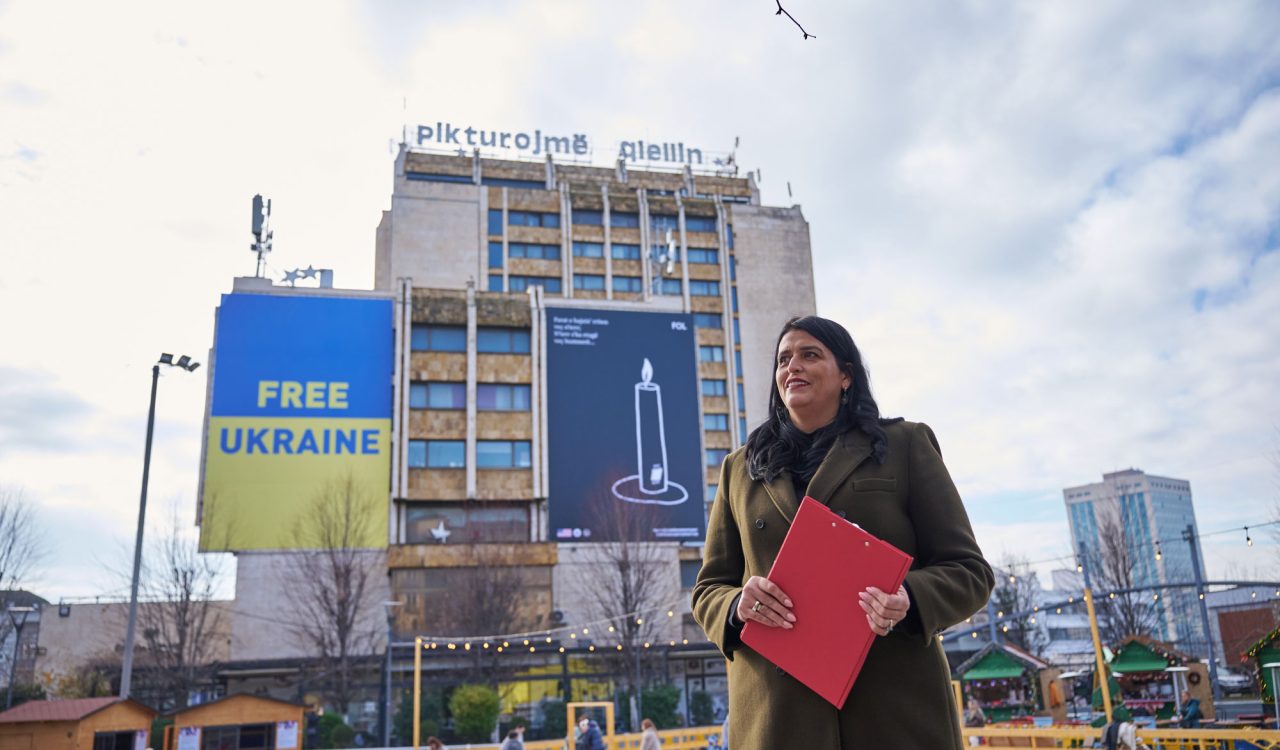Author: admin
Integrity of candidates, rule of law and good governance
Prishtina, February 6, 2025 – The Kosovo Institute for Law (IKD), the FOL Movement and the Initiative for Progress (INPO), with the support of the Rockefeller Brothers Fund, through a press conference published the report “Candidate Integrity, Rule of Law and Good Governance”. This report presents an analysis of candidate lists and political programs for the general elections of February 9, 2025.
The presentation of this report was made by researchers Gzim Shala (IKD), Burbuqe Kastrati (FOL) and Arbër Kadriu (INPO), who presented the main findings of the analysis. The report addresses the main issues related to certified candidates for elections who have problems with the law, as well as a qualitative assessment of the political programs of certified entities, with a focus on the rule of law, good governance and human rights.
Regarding the lists of candidates who have problems with the law, in terms of active indictments and convictions, three political entities: 1) Vetëvendosje Movement; 2) AAK-Nisma coalition; and 3) Democratic League of Kosovo, have included in their lists a total of 23 candidates who have problems with the law, which constitute about 7% of their total candidates. Vetëvendosje Movement has the largest number with 14 candidates (12.72% of the list), while AAK-Nisma coalition has included eight candidates (7.27%), and LDK one candidate.
Of the 23 candidates for deputies with legal problems, 16 of them face active indictments, while eight have final convictions. In total, 20 indictments have been filed against these candidates for 21 criminal offenses, which include criminal offenses of corruption such as “abuse of official position or authority”, as well as other criminal offenses, such as the use of a weapon or dangerous instrument (nine cases), unauthorized possession of weapons (five cases), obstruction or assault of official persons and other criminal offenses.
Furthermore, the report emphasizes that the political parties’ programs on justice in the 2025 elections differ significantly in both their approach and level of seriousness.
The Vetëvendosje Movement addresses justice only on one page of its program and does not refer to the Rule of Law Strategy at all. It proposes the creation of a Family Court, a Specialized Prosecutor’s Office and an Office for Disciplinary Investigations, but without any in-depth analysis of their need and functionality. The lack of a detailed plan and the duplication of existing mechanisms make this program considered frivolous.
The report further states that the Democratic League of Kosovo addresses justice more broadly, including vetting, the integrity of the justice system, the restoration of the independence of the Free Legal Aid Agency, and the digitalization of services. However, its program is not based on detailed analysis and does not refer to the Rule of Law Strategy. Also, some proposals, such as strengthening the criteria for the bar exam and the selection of judges, remain unclear and without sufficient argumentation.
Meanwhile, the Democratic Party of Kosovo has included 14 points in its chapter on justice, emphasizing anti-corruption strategies and judicial system reform. This program does not mention the Rule of Law Strategy at all either. The program in question proposes the creation of a National Bureau of Investigation, but this institution represents a duplication of the competencies of the Special Prosecution and may create excessive oversight over the judicial system. The program also foresees the adoption of a National Strategy for War Crimes and the creation of a Labor Court, but without a clear argument for the need for such an institution.
Meanwhile, the AAK-Nisma coalition sets the rule of law as a top priority, but does not offer concrete proposals for its implementation. The program of the Coalition for the Family contains 15 points on justice, but without elaboration on their implementation, while some other parties, such as the New Democratic Initiative of Kosovo and the Fjala Party, address the rule of law in a very general manner and without concrete measures.
This report also addresses other issues from the electoral programs of the main parties for the 2025 elections. The report notes that these programs also address issues such as transparency, good governance, public administration, gender equality and human rights, but most of them do not provide clear details on the implementation mechanisms and financial sources of the proposed reforms. PDK and LDK emphasize transparency and digitalization, but do not provide clarification on how these reforms will be implemented. AAK promises economic development and salary increases in public administration, but without a clear plan for budgetary support. The Coalition for the Family and smaller parties, such as the Egyptian Liberal Party and PDAK-LPB, mention the topics of the rule of law and equality, but their programs remain general and without a specific strategy well-defined for implementation.
The report highlights that the Vetëvendosje Movement focuses mainly on infrastructure projects, while not including key topics such as public administration, transparency and accountability in its program. Reforming the administration system, which has been one of the most debated issues during the last mandate, is not addressed in its electoral program, while the non-implementation of the Judgment on the Law on Salaries in the Public Sector is not mentioned anywhere.
The full report can be found here
According to this report, in general, most electoral programs do not provide concrete measures to ensure a depoliticized and efficient public administration. Gender equality and human rights are mentioned in general terms, but without clear measures to address them in practice. Also, while some programs talk about the fight against corruption and the strengthening of independent institutions, details on concrete mechanisms to ensure accountability and clean governance are lacking. Thus, the report states that most electoral promises remain general and without a well-defined strategy for effective implementation.
Government Implements Only 38% of the National Development Plan for 2024
Pristina, February 4, 2025 – The FOL Movement has published data from its Analysis of the Kosovo Government Program 2021-2025 and the Monitoring of the National Development Plan (NDP) for January-December 2024.
Burbuqe Kastrati, Project Manager at the FOL Movement, stated that FOL has monitored the activities outlined in the National Development Plan over the past four years.
“Out of 544 planned activities for the period January-December 2024, the Government of Kosovo has successfully implemented only 207 (38%), while 163 (30%) remain unfulfilled. Additionally, 174 activities (32%) from three ministries—the Ministry of Environment, Spatial Planning and Infrastructure; the Ministry of Finance, Labor and Transfers; and the Ministry of Industry, Entrepreneurship and Trade—remain unaccounted for, as these ministries have not responded to our inquiries regarding their implementation,” Kastrati stated.
She also noted that two ministries—the Ministry of Foreign Affairs and Diaspora and the Ministry of Regional Development—did not plan any activities for the period January-December 2024. While some activities in the National Development Plan are set to be implemented over multiple years, FOL specifically monitored those scheduled for completion within 2024.
Ministry-Specific Implementation Data
Kastrati presented the breakdown of implementation for each ministry:
- Prime Minister’s Office: Planned 62 activities; 35 implemented, 27 unimplemented.
- Ministry of Agriculture, Forestry and Rural Development: Planned 29 activities; 19 implemented, 10 unimplemented.
- Ministry of Justice: Planned 79 activities; 44 implemented, 35 unimplemented.
- Ministry of Education, Science, Technology and Innovation: Planned 20 activities; 9 implemented, 11 unimplemented.
- Ministry of Economy: Planned 30 activities; 14 implemented, 16 unimplemented.
- Ministry of Internal Affairs: Planned 71 activities; 41 implemented, 30 unimplemented.
- Ministry of Defense: Planned 6 activities; 2 implemented, 4 unimplemented.
- Ministry of Local Government Administration: Planned 4 activities; 1 implemented, 3 unimplemented.
- Ministry of Culture, Youth, and Sports: Planned 45 activities; 30 implemented, 15 unimplemented.
- Ministry of Health: Planned 21 activities; 10 implemented, 11 unimplemented.
- Ministry of Communities and Returns: Planned 3 activities; 2 implemented, 1 unimplemented.
Ministries That Have Not Responded
Three ministries failed to respond to FOL’s inquiries, leaving their implementation status unknown:
- Ministry of Finance, Labor and Transfers: Planned 57 activities.
- Ministry of Environment, Spatial Planning and Infrastructure: Planned 66 activities.
- Ministry of Industry, Entrepreneurship and Trade: Planned 51 activities.
FOL previously requested data from these ministries during the first six months of 2024 but did not receive a response. After filing a complaint with the Information and Privacy Agency (AIP), FOL obtained some responses, yet these ministries have again failed to provide updates. Consequently, FOL has submitted another complaint to AIP for lack of transparency regarding the implementation of the National Development Plan for 2024.
Declining Implementation Over the Years
According to Kastrati, FOL has compared implementation rates from previous years:
- 2021: 56% of the Government Work Plan was implemented.
- 2022: Implementation peaked at 62%.
- 2023: Implementation dropped to 36%.
- 2024: The National Development Plan was only 38% implemented.
These figures indicate a decline in government performance in executing its planned activities, with the highest level of implementation occurring in 2022.
Analysis of the Government Program of the Republic of Kosovo (2021-2025)
Prishtina, February 4, 2025 – The FOL Movement has published an analysis of the Government Program of the Republic of Kosovo for the years 2021-2025.
Mexhide Demolli-Nimani, Director of the FOL Movement, stated that analyzing the four-year program was more feasible since the government completed its full mandate.
“As the first government to serve a full term since the declaration of independence, we have conducted a comprehensive analysis of its program, which was approved on May 7, 2021. This program outlined an ambitious vision for Kosovo’s economic, social, and institutional development. However, its implementation has faced significant challenges that have hindered the achievement of key objectives. The primary obstacles include delays in policy adoption, legislative shortcomings, and a lack of inter-institutional coordination,” she said.
The Government Program had two key priorities at the time: managing the COVID-19 pandemic and economic recovery. Additionally, it was structured into 18 sectoral priorities, including Public Health and Social Protection, Rule of Law, Public Order and Security, Governance, Human Rights and Gender Equality, and the Promotion and Protection of Community Rights, among others.
According to Demolli-Nimani, the implementation of the program required legal reforms as a preliminary step. However, one of the most persistent issues was delays in the adoption and enforcement of laws. “A significant number of draft laws passed by the Assembly of Kosovo were contested for procedural violations and referred to the Constitutional Court. For instance, in December 2024, a group of deputies submitted 16 draft laws to the Constitutional Court, accusing the government of failing to follow legal procedures,” she added.
Monitoring of the meetings of the Kosovo Prosecutorial Council for the period July – December 2024
The FOL Movement, within the framework of the project ‘Raising awareness and trust of citizens in the institutions of the justice system”, in partnership with the Center for Advanced Studies (FIT), supported by the European Union, has continued to monitor the meetings of the Kosovo Prosecutorial Council, where it has published infographics on the monitoring period July – December 2024.
During the second six-month period, the Kosovo Prosecutorial Council has held a total of 11 meetings. Out of the 11 agendas published on the official website of the Kosovo Prosecutorial Council, 8 of them have managed to be published within the time stipulated by the Law on the
Kosovo Prosecutorial Council, specifically with Article 14, paragraph 2, which requires that ”The agenda of the Kosovo Prosecutorial Council must be made public at least forty-eight (48) hours before the meeting.
Out of the 11 meetings held, 9 agendas have been published in Albanian and 9 agendas have been published in Serbian. Meanwhile, two agendas were not published at all in either of the official languages.
During this monitoring period, 12 agenda items of the meetings held were closed to the public.
Monitoring of the Kosovo Judicial Council meetings for the period July–December 2024
Within the framework of the project “Raising awareness and trust of citizens in the institutions of the justice system”, supported by the European Union and in partnership with the Center for Advanced Studies FIT, the FOL Movement has continued to monitor the meetings of the Kosovo Judicial Council (KJC) for the period July – December 2024.
During this monitoring period, the KJC has held a total of 11 meetings. Out of the 11 agendas published on the official website of the KJC, 10 of them have been published within the time stipulated by the Law on the Judicial Council, specifically according to Article 14, paragraph 2, which requires that “The agenda of the Council must be made public at least forty-eight (48) hours before the meeting.” While one agenda has failed to be published within the stipulated time.
Of the 11 meetings held, the KJC has published the agendas in both official languages. During this monitoring period, 20 agenda items of the meetings held were kept closed to the public.
Regarding the composition of the Judicial Council, until August 7, 2024, the KJC had 12 members. However, since August, the KJC member from the Serbian community has resigned from her position, and since then, the KJC has been composed of 11 members. For more details, see our infographics here.
Monitoring Report on Disciplinary Violations of Judges and Prosecutors (July – December 2024)
Within the framework of the project “Raising awareness and trust of citizens in the institutions of the justice system”, supported by the European Union and in partnership with the Center for Advanced Studies (FIT), the FOL Movement has continued monitoring disciplinary complaints against judges.
During the period July – December 2024, the Investigative Committees of the Kosovo Judicial Council have issued 3 decisions for disciplinary violations against judges.
During the period July – December 2024, the Investigative Committees of the Kosovo Prosecutorial Council have issued 3 decisions for disciplinary violations against prosecutors, which have been public written remarks.
Reaction to politically motivated actions to seize the Independent Media Commission (IMC)
Prishtina, January 17, 2025
Through this reaction, we strongly condemn the politically motivated actions to interfere with the independence of state institutions, namely the dangerous and illegal initiatives aimed at changing the leadership structures of the Independent Media Commission (IMC) before the end of their legal mandates, through amendments to the current Rules of Procedure of the IMC.
During today’s meeting of the IMC, the members of this institution illegally approved the amendment to the Rules of Procedure, enabling the election of the Chairman and Vice-Chairman of the IMC within one month before the end of their legal mandates. This act was undertaken without going through the public consultation process, thus violating Article 8 of the Law on the Independent Media Commission, which requires citizen involvement in the amendments to the by-laws.
After amending this regulation, the members of the IMC changed the current leadership structures of the IMC, in violation of legal procedures, creating a dangerous precedent aimed at political capture of independent institutions, violating the fundamental principles of democracy and the rule of law.
Furthermore, the Assembly of Kosovo failed to elect the members of the IMC Board in a timely manner before the start of the election campaign, leaving this board incomplete and hindering the normal functioning of this institution in this critical period. Such delays have directly impacted the efficient functioning of the IMC, and consequently, it has become difficult to supervise the media and maintain a fair and impartial media climate during this important political period.
The IMC, as an independent body, has the mission of ensuring a fair, open and equitable system for regulating media services, guaranteeing accurate and impartial information to citizens. Attempts to instrumentalize this institution in the service of political interests seriously undermine its independence and place it under direct political control, jeopardizing its oversight and transparency role.
These actions represent a clear attempt to “capture” one of the main pillars of a functioning democracy – free and independent media. Any attempt to politicize the IMC is an attack not only on this institution, but also on the right of citizens to be informed freely and impartially. This violates freedom of expression and creates an atmosphere of fear and self-censorship in the media sector, seriously damaging public trust in the integrity of the media and in democratic processes.
Preserving media freedom is one of the main pillars of democracy, and any attempt to weaken it should be treated as a serious threat to the country’s very democratic future.
Hypothetical personal data breach scenarios and relevant rights protection guidelines
“FOL Hapur-Open Discussion” on the implementation of the Law on Personal Data Protection
Prishtina, December 24, 2024 – The FOL Movement held today a “FOL Hapur-Open Discussion” discussion on the implementation of the Law on Personal Data Protection with the Commissioner of the Information and Privacy Agency, Ms. Krenare Sogojeva – Dermaku, where they discussed the challenges and shortcomings in the implementation of the Law on Personal Data Protection.
During this discussion, the findings of the research report “Level of Implementation of the Law on Personal Data Protection – Report on Survey Results” were also presented, which provides an overview of the current situation and recommendations for improving data protection in public institutions.
The report highlighted a number of shortcomings in the implementation of the Law on Personal Data Protection, starting from the lack of drafting privacy policies by public institutions; the lack of regulations on security measures and protection of personal data; the lack of specific protocols for the management of sensitive data; the lack of defined periods for the retention of personal data, and many other issues.
The experience of the whistleblower exposing the million-dollar abuses at MMPHI, narrated exclusively at the FOL roundtable
Prishtina, 12/10/2024
The FOL Movement, within the framework of the Anti-Corruption Week, organized an important roundtable discussion on the topic: “Whistleblowers from a Practical Perspective”, where the challenges and difficulties faced by whistleblowers, as well as their essential role in the fight against corruption, were addressed.
The Director of the FOL Movement, Ms. Mexhide Demolli-Nimani, who moderated the discussion, said that whistleblowing as a powerful mechanism for combating corruption and for reporting other illegal acts and actions, is particularly important in a society where citizens’ trust in public institutions is weak and is constantly challenged. According to her, the act of whistleblowing becomes a courageous act and a means to challenge injustices, contributing to the protection of the public interest and the fight against abuses.
“Whistleblowing does not only represent an act of reporting; he is a courageous voice for building a system that respects democratic values and the rule of law. Whistleblowers, who often take risks to denounce abuses and misuses, as well as withstand great pressures, are those individuals who refuse to remain silent in the face of misuses and act as guardians of the public interest”, said Ms. Demolli-Nimani.
In this discussion, Ms. Makfirete Dibrani, Head of the Regional River Basin Authority (ARPL), revealed for the first time her story about the whistleblowing she made about the millions of euros of misuses in this ministry, sharing her experience in reporting misuses related to the forgiveness of debts of water bottlers by the Ministry of Environment and Spatial Planning.
Ms. Dibrani highlighted the challenges and difficulties she faced during the whistleblowing process, as well as the consequences suffered after denouncing this case. She shared the assessment of the importance of legal protection for whistleblowers and the need to provide institutional support for those who denounce abuses and corruption.
Speaking about the consequences of her reporting, she said, among other things, “It was not an easy path at all, because I dared to denounce the misuse of citizens’ taxes. I began to experience extraordinary pressure to intervene in the decision-making process. I faced disciplinary committees, with written warnings from the person who is in detention because of my denunciation. These attempts to remove and discredit me did not end there. It was a period filled with stress to protect not only my personal integrity. I faced all of this to stop public abuses.”
Ms. Dibrani also spoke about the threats and sabotage she had suffered from her superiors, as a result of reporting. “One of the most obvious forms of discrimination was my exclusion from study visits inside and outside the country and other issues to sabotage my professional development. The leader who abused public taxes had obliged my colleagues to ignore me. This was a way to get me out of the job, but I remained steadfast,” she said.
She also said that she is proud that she did not give in to the difficulties and pressure. She also called for the protection of whistleblowers, who do not ask for privileges but only the protection provided by the law.
Finally, Ms. Dibrani publicly signaled another issue within the ministry. “I will also report on the cleaning of water beds and capital projects that have been awarded recently. Both projects are divided into 2 million and 4 hundred thousand euros, many thousands of times more expensive than Croatia.” According to her, we dare to make such concessions.
The Director of the Agency for the Prevention of Corruption, Mr. Yll Buleshkaj, said that we have officials of the institutions who are responsible for handling whistleblowers, as well as officials of the agency.
“Whistleblowing is considered an individual courage, and moreover it is an action that serves the collective interest. In this way we call on everyone not to be just listeners and discussants, but to participate in reporting. Citizens’ trust in institutions is not gained only through words, but also through deeds. The implementation of legislation, regardless of whether it is the best in the world, seems to lack the context of Kosovo’s circumstances. We have practical problems in its implementation,” said Buleshkaj.
Gzim Shala, senior researcher at the Kosovo Law Institute, said that if a government, an institution or an enterprise truly has the primary goal of fighting corruption, it will see whistleblowers as useful and not as enemies of the institution.
“The need for political will to protect whistleblowers. The level of political will to protect whistleblowers is equivalent to the level that a government, a certain institution has to fight corruption. If a government, an institution, an enterprise truly has the primary goal of fighting corruption, it will naturally see whistleblowers as useful and not as enemies of the institution”, said Shala.
At this roundtable, FOL also published the Brochure “Obstacles to the Effective Implementation of the Whistleblower Protection Law”, which contains FOL’s activities in advocating for the implementation of this law, as well as the main challenges and obstacles to the implementation of this law, encountered by FOL during this monitoring.
Performance: “Seeds of Falsehood”
Pristina, 9 December 2024 – FOL Movement, with the support of the U.S. Department of State – Bureau of International Narcotics and Law Enforcement Affairs (INL), marks the International Anti-Corruption Day through the performance “ Seeds of Falsehood “, with the common goal: raising society’s awareness in the fight against corruption and the inevitable need for collective reflection on the harmful consequences of this phenomenon.
Mexhide Demolli-Nimani, Executive Director of FOL Movement, said that on this marked day, we all need to reflect on the phenomenon that damages the foundations of the state and the healthy substances of our society, with such a great impact on the quality of our social life and institutional progress.
“In addition to being an illegal act, this phenomenon constitutes an ongoing process that undermines citizens’ trust in public institutions, threatens democracy and the rule of law, inevitably weakens the integrity of state institutions, increases social inequality, and hinders the country’s economic development,” said Demolli-Nimani.

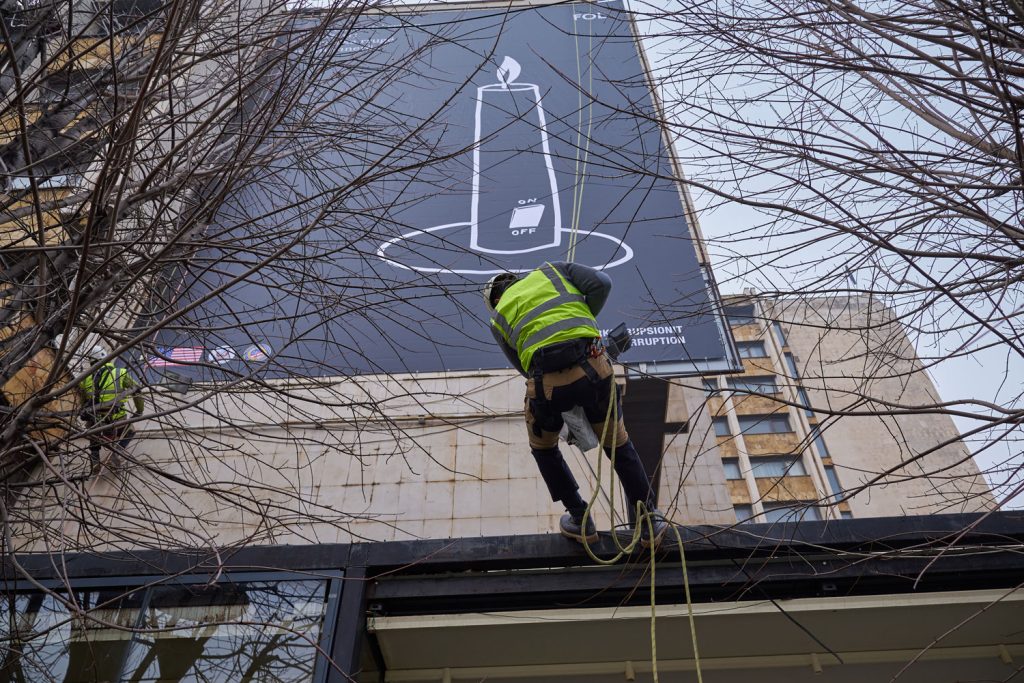
According to her, in Kosovo, since its independence, the fight against corruption has been and continues to be an essential state and social challenge. Different governments have designed and approved different laws and strategies, and have made various promises. However, every government that has led our country has failed to fulfill even the promises they themselves had made.
“Even the current government, which came with the political motto “Justice and Work”, and that they would govern with clean hands and fight corruption, has failed to fulfill the promises made. In addition, a series of scandals and corruption cases have burdened ministers, functionaries and senior officials of this government.
Nepotistic appointments, unjustified spending of public funds, and dubious tenders without transparency have become elements of institutional dysfunction, while the failure to finalize the drafting of the National Strategy for Combating Corruption clearly demonstrates the will of this government to fight corruption, which for two years failed to finalize such a strategy.
Demolli-Nimani said that accusations of misuse of state reserves, failure to declare assets, forgiveness of millions of euros in debts for Kosovo’s water bottlers, interference in the justice system, control of the media, pressure on journalists and public lynchings, single-source contracts, parliamentary “evening bargains” – were just some of the practices that have characterized this government. These practices certainly have caused great concerns among citizens and damaged their trust in public institutions.
Reports from the most credible national and international organizations have highlighted that political interference, captured administration and high presence of corruption are major obstacles to the implementation of the law. Weaknesses of the judicial system and the lack of accountability have created an environment where corruption is not only tolerated, but also cultivated.
This situation requires immediate intervention followed by radical and effective reforms to build institutions that focus on prosperity and gain the trust of citizens, as well as to prevent and combat this dangerous phenomenon in all important state and social circles.
According to her, the phrase “Fight against corruption” should not only be used as a political slogan in election campaigns and media conferences, but should be followed up with effective strategies and policies and concrete results.
Corruption is not an isolated and abstract phenomenon. Corruption, in one way or another, affects the most important aspects of citizens’ lives, such as: education, health, justice and the economy, giving priority to personal interests over public ones. Faced with this reality, a joint commitment is needed from public institutions, civil society and citizens to combat this phenomenon.
In marking of this day, we have chosen to present an artistic performance that symbolizes the impact of corruption in our society. The artistic work “Seeds of Falsehood” reflects a reality where lack of honesty and transparency creates a deep darkness that hinders the development of the country.
The symbolism of the work is clear: seeds planted without honesty cannot bear healthy fruit. Therefore, we should not see corruption simply as a stain on the white paper of our society, but as a false seed that sprouts, blooms, and poisons our daily soil.
But at its center, there is a flickering light, small but visible – like the courage of a citizen who decides to speak up, a whistleblower, which constitutes the first step towards change.
This message reminds us that change begins with each one of us. Everyone’s commitment, either by denouncing injustices or by supporting reforms, is vital for building a future without corruption.
The fight against corruption is not only the duty of justice institutions, but a shared responsibility of all citizens.

The fight against corruption begins with small deeds: with the simple act of rejecting injustice.
So today, let’s make a joint commitment: to be the lights of the way towards a fairer, more transparent and more integrity-oriented society.
Contents of the Handbook:
The “Seeds of Falsehood” handbook, created in collaboration with artist Driton Selmani, is a visual guideline that aims to help people see and understand the corrupt practices that often hide behind the surface. This 11-point manifesto is designed to show how even a small action or thing can be part of hidden deals, made behind closed doors, or part of “seeds” that are fraudulently subsidized.
With illustrations depicting everyday situations, this handbook provides an easy visual way to understand how seemingly innocent phenomena are connected to invisible influences, which help to uncover dark deals. Ironic language is used to awaken people’s awareness, to make them understand the influences that often go unnoticed, and to empower them to see and avoid these hidden deals that affect everyday life.


Seeds of Falsehood is a tool to bring light to a more just and clean society, to provide simple and clear explanations to fight injustices and to promote honesty and responsibility.
Anti-Corruption Week 2024 is organized thanks to the support of the U.S. Department of State – Bureau of International Narcotics and Law Enforcement Affairs (INL).
Accelerated Legislation in the Kosovo Assembly
Today’s session of the Kosovo Assembly underscores the urgent need to address the ruling party’s practice of adopting key laws for electoral purposes without adhering to the standards and procedures required in a democratic state.
FOL presses deep concern over decisions made during this session of the Assembly of the Republic of Kosovo, which undermines the principles of democracy and the rule of law.
The review and approval in principle of the Draft Law on the State Bureau for Verification and Confiscation of Unjustifiable Assets—without allowing adequate time for public discussion and consultation with relevant stakeholders—demonstrates a rushed and politically motivated approach. Passing such legislation within a single day appears to prioritize electoral gain over a genuine commitment to combating corruption and illicit enrichment. This practice undermines the legislative process and directly contradicts the EU Country Report’s repeated criticisms, which highlight that adopting laws through accelerated procedures violates democratic standards.
Additionally, the appointment of family members of the Minister of Environment, Spatial Planning, and Infrastructure, as well as the First Deputy Prime Minister, to the Board of Directors of the public enterprise KOSTT, is a blatant example of nepotism and conflict of interest. Such actions are troubling indicators of public institution capture and the misuse of power for private benefit.
FOL believes these developments reflect a dangerous trend toward weakening the rule of law and prioritizing narrow political interests. As the highest legislative and oversight body, the Assembly of Kosovo bears a critical responsibility to uphold institutional integrity, strengthen the rule of law, and ensure transparency, accountability, and respect for democratic standards.
Practical Guideline on Access to Justice
The government is proposing flawed legislative practices that undermine legal certainty.
Pristina, November 7, 2024 – The Government of the Republic of Kosovo, through the provision of Article 33 of the Draft Law on Budget Allocations for the Budget of the Republic of Kosovo for 2025, which has been proposed to the Assembly of the Republic of Kosovo, is establishing a harmful legal and legislative practice, by interfering with the Law on Salaries in the Public Sector.
Accordingly, Article 9 of the Law on Salaries in the Public Sector has determined that the monetary value of the salary coefficient of employees in the public sector shall be determined by the annual budget law, while in no case has it authorized the Government of the Republic of Kosovo to change the structure of the coefficients with the annual budget law, except as determined in the Law on Salaries in the Public Sector.
This proposed practice has raised concerns about the manner in which it is being followed, as it does not fully respect the provisions of the Law on Salaries in the Public Sector, which is a special law (lex specialis) that determines in detail the structure and levels of salaries in the public sector. Its amendment through another special law, such as the Annual Law on Budget Allocations for the Budget of the Republic of Kosovo, creates a wrong precedent in legal and legislative practice, bypassing the usual procedures for legal amendments in the Assembly.
Amendments to the Law on Salaries through the Law on Budget may raise questions about the coherence and sustainability of the legal system. Furthermore, this practice may pave the way for other amendments to specific laws through different laws in the future, which could be used inappropriately.
Amendments to laws should be carried out through the legislative procedures provided for, respecting the principles of transparency and stakeholder involvement. Only this guarantees that any change is well-researched, sustainable and in line with constitutional and legal principles.
Consequently, we call on the members of the Assembly of Kosovo to act responsibly and protect the integrity of Kosovo’s legal system, ensuring that any legal change is adopted only in accordance with constitutional and legal procedures and principles, to avoid dangerous precedents that could harm the interests of citizens.



